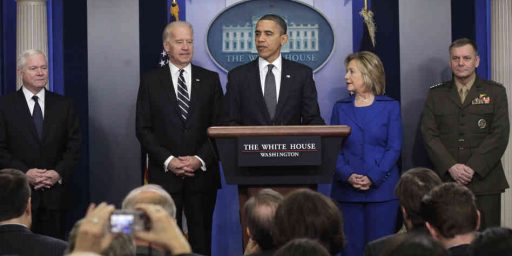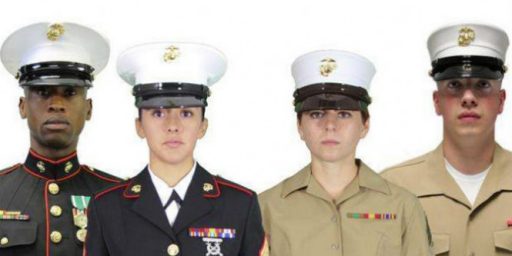Marine Commandant Fears Iraq Effects on Corps
Marine Commandant James Conway worries that the USMC is “becoming a second land Army.”
Commandant Gen. James Conway said Monday he is concerned about the Marines Corps’ ability to respond to security flare-ups around the world on short notice because of the demands put on it by the Iraq war.
In recent years, the Marine Corps has emerged as a “second land Army” tasked with securing Iraq and must buy heavy equipment, including a fleet of 3,700 mine-resistant vehicles, to protect its personnel from roadside bombs, Conway said. “I’m a little bit concerned about us keeping our expeditionary flavor. … We are much heavier than ever before,” he said at a lunch sponsored by the Center for New American Security.
Conway’s comments come amid discussion at the Pentagon that the Marines pull its forces from Iraq and send them instead to Afghanistan to take the lead combat role there. On Monday, Conway declined to comment because he said he had not yet briefed Defense Secretary Robert Gates.
Gates recently told reporters that he was aware of the suggestion, but had not seen a plan. “My understanding is that it’s, at this point, extremely preliminary thinking on the part of perhaps the staff in the Marine Corps,” Gates said. “But I don’t think at this point it has any stature.”
On a separate issue, Conway said Monday he agreed with recent assessments that al-Qaida in Iraq is significantly crippled by recent U.S. efforts. But, he added, the terrorist network has shown previously an “amazing ability to regenerate.” Conway cautioned his view was restricted to the western Anbar province, where Marines have control. “Are they crippled? Yeah,” he said. “Are they still dangerous? Absolutely.”
Conway is likely right about the effects of the war on his beloved Corps. The former Army officer in me is mildly amused, however, that it’s now the Marine Corps expressing this concern; the Army has been railing about a second land Army since the Marines exploded into something much more than an expeditionary Corps during World War II. At the Key West summit in 1948, the Army fought unsuccessfully to scale the Marines back to their former status.
The idea of dividing the Afghanistan and Iraq missions between the Marines and the Army was reported last week by Thom Shanker.
The Marine Corps is pressing to remove its forces from Iraq and to send marines instead to Afghanistan, to take over the leading role in combat there, according to senior military and Pentagon officials. The idea by the Marine Corps commandant would effectively leave the Iraq war in the hands of the Army while giving the Marines a prominent new role in Afghanistan, under overall NATO command.
The suggestion was raised in a session last week convened by Defense Secretary Robert M. Gates for the Joint Chiefs of Staff and regional war-fighting commanders. While still under review, its supporters, including some in the Army, argue that a realignment could allow the Army and Marines each to operate more efficiently in sustaining troop levels for two wars that have put a strain on their forces. As described by officials who had been briefed on the closed-door discussion, the idea represents the first tangible new thinking to emerge since the White House last month endorsed a plan to begin gradual troop withdrawals from Iraq, but also signals that American forces likely will be in Iraq for years to come.
At the moment, there are no major Marine units among the 26,000 or so American forces in Afghanistan. In Iraq there are about 25,000 marines among the 160,000 American troops there. It is not clear exactly how many of the marines in Iraq would be moved over. But the plan would require a major reshuffling, and it would make marines the dominant American force in Afghanistan, in a war that has broader public support than the one in Iraq.
The idea actually makes a lot of sense from a practical standpoint. Still, it’s awfully convenient that the trade would take the Marines out of the political quagmire in Iraq and put them in charge of the lower profile mission in Afghanistan. Then there’s the issue of bureaucratic politics.
It is not clear whether the Army would support the idea. But some officials sympathetic to the Army said that such a realignment would help ease some pressure on the Army, by allowing it to shift forces from Afghanistan into Iraq, and by simplifying planning for future troop rotations.
The Marine proposal could also face resistance from the Air Force, whose current role in providing combat aircraft for Afghanistan could be squeezed if the overall mission was handed to the Marines. Unlike the Army, the Marines would bring a significant force of combat aircraft to that conflict.
Whether the Marine proposal takes hold, the most delicate counterterrorism missions in Afghanistan, including the hunt for forces of Al Qaeda and the Taliban, would remain the job of a military task force that draws on Army, Navy and Air Force Special Operations units.
Military officials say the Marine proposal is also an early indication of jockeying among the four armed services for a place in combat missions in years to come. “At the end of the day, this could be decided by parochialism, and making sure each service does not lose equity, as much as on how best to manage the risk of force levels for Iraq and Afghanistan,” said one Pentagon planner.
Tensions over how to divide future budgets have begun to resurface across the military because of apprehension that Congressional support for large increases in defense spending seen since the Sept. 11 attacks will diminish, leaving the services to compete for money.
Even in wartime, the battle for budget share takes center stage.






You would think that, from a bureaucratic standpoint, the Marines would want to share in the credit for the great victory that, I read everywhere this week, we are having in Iraq again. (How many times can you win one war, anyway? We’ve won this one over and over.)
The Marines were the first US troops in force to go the Afghanistan:
And the former Marine in me recalls being amused at a story in the NY Times about this wherein young Army officers were wondering why the Army couldn’t have MEU-like capability. 🙂
(I also recall from the story that some Taliban drove out to the base in pickup trucks armed with machine guns to see what the hubbub was. Reality check insued.)
I would be interested on the way they would handle logistical support and infrastructure. Would most of the bases logistic in Afghanistan be turn over to the Navy or what? Not that it can’t be done but the specifics could be interesting.
Trivial mind that I have, I am bemused by the notion that the Marines should focus their efforts on a landlocked country.
The USMC has historically lobbied for independence from the Navy and as an all-purpose ground fighting force.
Be careful what you wish for.